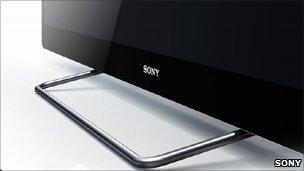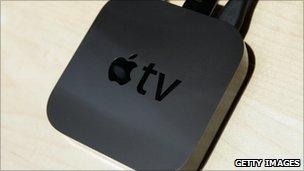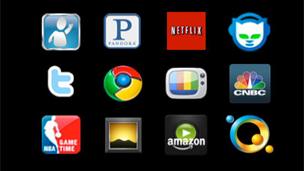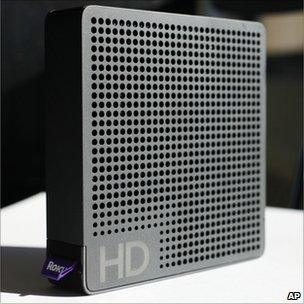Google and Apple heat up battle for TV screens
- Published

Google TV can be accessed through net TVs and set-top boxes
The future of television is in flux as traditional manufacturers battle hi-tech companies to control the living room, say analysts.
The view comes as Sony unveiled the first Google-powered TVs.
Connecting the TV to the web has become a focus among manufacturers and set top box makers vying for market share.
Google's emergence has energised things said commentators as has Apple's renewed bid for domination with its TV converter.
"There are so many variables just now and no one clear winner," Paul Erickson, senior analyst with IMS Research told BBC News.
"Everybody is trying to own the living room experience. Google has definitely got everyone on their toes and all eyes are on Sony to see how it does with its Google TV offering."
Over five billion people watch TV which is more than the number of people who use mobile phones or computers.
'Jockeying for position'
Some in the business believe that in terms of the connected TV, it is a two-horse race with Google and Apple pitched against one another.
Last Wednesday Logitech launched its Revue set top box as part of a partnership with Google to merge the TV and the internet.
A day later Apple's box went on sale aimed at connecting the TV to a wealth of internet-delivered TV shows, movies, pictures, podcasts and music.

Apple previously regarded its TV box as a 'hobby'
"Everybody is jockeying for position but all eyes are on Google and Apple in this race," said Andrew Eisner content director for consumer site Retrevo.com.
"Google and Apple will be slugging it out to win consumers and own the TV operating system and put apps in the living room. I am a big believer that software sells hardware."
IMS Research's Mr Erickson disagrees.
"Neither one has proven that they have any strong traction in the TV arena yet. Apple has been on the market for a while with Apple TV and have yet to make it a hit. Despite their strong consumer brand identity and loyalty there is something about the product that is a fundamental miss.
"Google TV is still a new offering and still has to establish a brand in TV but I think if executed well, it could really change things," said Mr Erickson.
'Innovation'
Google unveiled its plans for the living room at its developer conference in San Francisco earlier in the year.
At the time the search giant called it an "adventure where TV meets web, apps, search and the world's creativity."

Google promises to bring apps to the TV
"We recognised that the pace of innovation in the TV space was not keeping up with the improvements in desktop and mobile computing," said Google spokesman Eitan Bencuya.
"Over the past few years consumers have been asking for a better way to find video content and more ways to find and access web video content, while developers have been looking for an open way to develop applications for TVs."
Apple boss Steve Jobs has famously referred to Apple TV as a "hobby". Its failure to catch on with consumers is something Mr Jobs acknowledged at a news conference in September.
""We've sold a lot of them, but it's never been a huge hit," he said.
The new version of the product has been reduced from $299 to $99 but will only allow people to rent content rather than buy it.
Initially, it will only offer TV shows from a small handful of providers such as Fox, ABC/Disney and the BBC.
"We think the rest of the studios will see the light and get on board pretty fast with us," said Mr Jobs.
Google also underscored the difficulty in getting content partners onside.
While the major networks, ABC, CBS, Fox and NBC will not take part several other internet companies and media outlets will. These included HBO, CNBC, Twitter, Netflix and Amazon.
Analyst Van Baker of Gartner said what Google's offering is something of a half-way house.
"Their vision is a good vision but complete integration between the internet and TV experience I don't see happening because the partners they need to have lined up see it as too big a threat.
"The reality is that it's not about technology. It's about business models and right now the networks get about 90% of their revenue from TV service providers like the Time Warner's, Comcast's and Direct TV's of the world.
"The best Google can do is deliver what amounts to a side-by-side experience. On one side of the screen you get the standard TV user interface either over the air or from Time Warner or Comcast. In the other part of the screen you get access to the internet via Google," added Mr Baker.
'Empowering the TV'
Research shows that most people renew their TV sets every seven years.
For Logitech, best known for producing mouse and remote controls, this presents an opportunity in the market.
Its Revue set-top box with Google's software acting as the brains will let users browse the web, stream videos from sites like YouTube or Hulu, play Flash games, connect with friends on social networks and even show off photos on the biggest display in the house.
It will go on sale at the end of this month for $299.

Other players such as Roku are competing for a slice of the living room
"We are building the engine for Google TV - the box and the keyboard which will take Google TV to market," Rajiv Bansal, senior manager with Logitech's digital home group told the BBC.
"For people who have recently bought a new set we are empowering the TV again by bringing all this content to the television set, the best screen in the house, and making it centre stage."
Google is offering its software platform free to manufacturers, as it does with Android, in the hopes of broadening its advertising base from the Web to TVs.
While Logitech and Sony are the first to get on board, Google is planning to expand to a number of other manufacturers next year.
Other set-top boxes range from $60 for the newly released Roku to $200 for the Boxee, due to ship next month.
IMS Research's Mr Erickson said he thinks Sony's Google TV will make at impact at the expense of set top box manufacturers.
"The integrated experience is going to be much more powerful to sell to consumers than a separate box. The less steps you have to take to get this working the better - no extra wires, no extra remotes.
'Experimental work'
Google and Apple are not alone in trying to change how people watch TV and grab some market share.

Logitech offers a range of devices for Google TV
A slew of manufacturers from Panasonic to LG and from Sharp to Toshiba are all offering all-in-one internet TV's.
Samsung, the biggest manufacturer in the space said it believed its plans for smart connected televisions will help it maintain its lead.
"We are in the transitional period where we are witnessing a shift in the TV paradigm and I do believe we are at a starting point of seeing companies try to control the living room," BK Yoon, the company's president of visual display business unit, told BBC News in September.
So far though there are no runaway winners according to Gartner's Mr Baker.
"We have a lot of experimentation going on by content providers. A lot of experimentation with the consumer electronic manufacturers and Apple and Google trying to be brokers in the mix.
"There is everything to play for. It's a huge market. Google would naturally love for this to succeed for them because it would give them the TV advertising market and that is a pot full of money that would make what they currently do look small," added Mr Baker.
For the consumer, the plethora of offerings now and in the future means they can afford to wait a while before deciding where to spend their cash.
Forrester research said it expected that the number of web connected TV's to go from about two million this year to 43 million in the US by 2015.
- Published1 September 2010
- Published18 May 2010
- Published20 May 2010